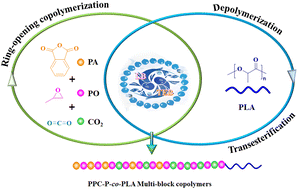Carbon dioxide (CO2) has been utilized for synthesizing biodegradable polymers to promote sustainable energy conservation and mitigate emissions. Nonetheless, the low glass transition temperature of amorphous CO2-based polyester–polycarbonate (PPC-P) significantly impedes its practical application. Herein, semi-crystalline copolymers, PPC-P-co-PLA, were successfully synthesized via copolymerization of propylene oxide (PO), phthalic anhydride (PA), and CO2 in combination with PLA through transesterification catalysed by Lewis acid–base pairs in a one-pot/one-step method. Metal-free catalysts were utilized for the first time to catalyse both ring-opening copolymerization and transesterification reactions for copolymer synthesis. The mechanism study of PLA transesterification catalysed by triethyl borane (TEB)/Lewis bases revealed that effective depolymerization and transesterification of PLA hinge on α-H chemical shift alterations induced by the Lewis bases. Lewis acid–base pairs facilitate the formation of PPC-P-co-PLA multi-block copolymers by terminating one end of PPC-P with PLA segments via continuous transesterification reactions. Compared to PPC-P, the copolymers exhibit an increase in glass transition temperature by 5–7 °C and an elevation in thermal decomposition temperature by 18–45 °C. The optimal mechanical and rheological properties of PPC-P-co-PLA multi-block copolymers are achieved at a PLA concentration of 8 wt%. This study opens new avenues for the synthesis of semi-crystalline polyester–polycarbonate-based copolymers with high glass transition temperatures, thereby enriching the theoretical foundation for the synthesis of block copolymers.
